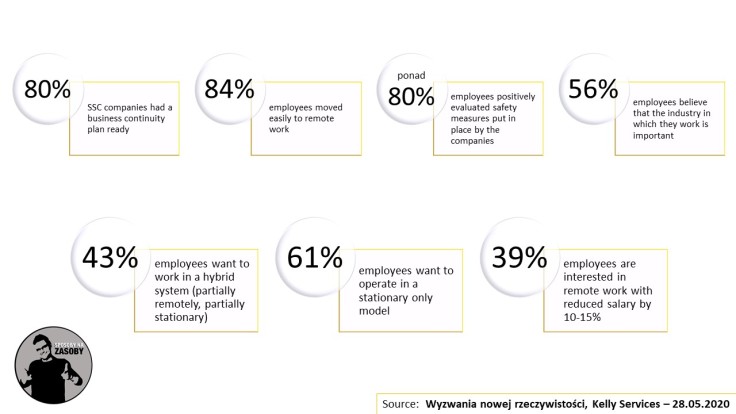How is everything going in HR world? A few weeks have now passed since we started getting back to some kind of normality and whilst some industries have started getting back to pre-covid levels, other industries are still feeling the impact of the covid pandemic crisis. Nevertheless it’s worth us asking what has changed and what we should expect?

Employer branding à la COVID
Let’s start from the top. Not so long ago, I wrote about the fact that the candidate will hold the employer accountable and that despite difficult business moments, it is worth working on reducing the risk of a damaged reputation. You can find out a bit more on this topic in my article: Employee experience in crisis. Leadership exam. For years we have seen HR influencers showing us the best practices in building and managing an employer branding strategy. The job market is tough, candidates are demanding, and competition is hard so with external factors changing, the employer branding strategy needs to evolve and adapt to what is the reality. The Employer Brand strategy that once last for years no longer exists. Months of the Coronavirus has reinforced this message, so what effects could we expect? However, my dear HR and EB experts, don’t you think that right now many of the companies have simply showed us the middle finger, especially to candidates and employees! The one deadly sin is the inconsistency between the strategy and actions taken by companies in practice. You can’t just say what the organization’s values are. For most candidates and employees, they want to see the values and mission of the company in action, they want to identify with the organization they work with.

On the topic of feedback in the recruitment process, I will say few words below. It is very sad to see that many of the companies have failed the test on internal and external communications during this covid crisis, or there has literally been no communication with some leaders forgetting how to react properly in difficult situations. You can read and learn more on how to control emotions and stress at work, by reading my article: Talk about the facts. It is completely understandable that during these hard times, you need to search for savings and the natural place to start is by looking at those on your payroll and here is the irony. On one hand we are told that company means people and without people, that company doesn’t exist. On the other hand, in finance we are told that people costs the most?
To be clear, it’s not that companies need to make difficult decisions, to remain financially viable or to reduce the teams, to implement pay cut or to use any other measures to survive. What is important, is to make an examination of conscience and honestly answer the question whether all implemented activities were in line with the previously published mission, vision and employer branding?

Let’s learn from the best.
The award for ‘Best Practices in a crisis’ goes to the SSC/BPO industry. According to research made by Kelly Services, 80% companies had a business continuity plan ready. 84% of employees moved easily and fast to the remote mode. The current career situation of 78% of employees didn’t change, meaning no redundancy nor reductions in pay. It’s worth mentioning that only 2-3% of employees experienced some kind of reduction. Every second employee thinks that the industry in which they are working in, makes a huge difference, which is an important point for companies in building new EB strategy. Communication went online in 70% of cases – keeping in contact with the employees via emails and video-conferences. The precautionary (safety) measures taken by Shared Service Centers were positively assessed by over 80% of employees.

Such a good results increased the large organizations interest in opening their Shared Service Centers (or Global Business Centers) in Central and Eastern Europe. Much more than in Asian countries.
New benefit – we kept our work places.
Reviewing in last week’s recruiter’s posts on social media, I see that there is a new branding strategy in practice when it comes to promoting new job opportunities. Job averts are now starting with the message “we are not firing in this time of crisis”. Objectively it makes sense as it shows that the company is surviving/survived this crisis, so a candidate can expect stability. It is also difficult to estimate the number of companies operating in those industries which have hardly been impacted by this crisis. On the other hand, during the time where there is literally no talents available, companies say to the applicants “come to us, we’re not reducing staff”. However, it is odd as recruitment processes are very expensive for the companies, so there should be no intention in redundancy while actively recruiting. However is this promises are enough in face of a risk of redundancies in next crisis situation?

The feedback culture fell down to zero?
We are always talking about the importance of feedback in the recruitment processes. However, reviewing the current job market I must say that this is unsatisfactory. Rhetoric “no because no” is not enough. Candidates are hearing “after carefully reviewing your profile, we’ve selected another candidate”. I’m not convinced that this is the best use of the feedback process. How we present negative feedback, which I understand can be a challenge, you can read in my article: Candidate Experience! Good feedback is worth its weight in gold. Today, I would like to focus on a few examples of how the lack of feedback or wrongly prepared feedback can ruin a recruiter’s reputation and consequently the reputation of the company’s EB strategy.

- No connection/rapport with the candidate – recruiters should be in touch with the candidate when the recruitment process spans a long period of time. Ideally once a week, call the candidate or send an email to inform them about the status of the recruitment. Communication is key.
- Candidate has been rejected after interview with the recruiter. A recruiter should always present feedback after their assessment. There is no excuse for a lack of feedback from the hiring manager.
- “We’ve selected another candidate, but we’d love to keep your CV for the future” – the message makes no sense if we are not prepared to provide feedback. Whilst this is a response of some sort, it doesn’t provide any value to the candidate. Whether it’s true or not, candidates deserve constructive and more importantly ‘helpful’ feedback.
- “We’ve hired another candidate” – can’t be credible when the recruitment process remains open. Apart from the obvious lie, let’s remember that candidate is still following the company he or she applied.
- Rejected because of lack specific skillset, i.e. experience in specific sector. Let’s make sure this requirement was mentioned in the job description (advertisement).
- Candidate has been rejected, however the decision maker/hiring manager didn’t pass on the official reason. The goal for the recruiter is to try to get feedback and pass it on successfully. When a candidate has been involved in several stages of the recruitment process, there may be challenges in what feedback can or cannot be shared with the candidate. Maybe the hiring manager just doesn’t get back to you. In this situation, it is worth being transparent with the candidate, be honest and share what we know. A recruiter might be tempted to provide feedback following their own assessment of the candidate. Nevertheless, I strongly recommend simply informing the candidate what profile has been selected, e.g. we have selected a candidate with a stronger industry knowledge or with a higher language level.

We should all remember that the role of a recruiter is not simply to manage the recruitment process but to also educate the clients and the business. The future and shape of the job market is in our hands. NO FEEDBACK = NO CANDIDATE = NO REPUTATION!
HR vs. AI
Have you been thinking how HR departments can/could be replaced by artificial intelligence? Let’s be honest, HR are the ones who are turning off the light during a crisis situations in a company. There are many digital improvements, process automatizations, recruitment bot implementations. COVID has shown how AI may replace human beings. The job descriptions which now includes sentences like “online recruitment” made all of the automatized job boards crazy. Now everyone who has “recruitment” in their profile are receiving random and mismatched job adverts only because most of them are signed as “online recruitment”.

Big thank you to my amazing peer Scott for his support and proofreading! 🙂


Dodaj komentarz